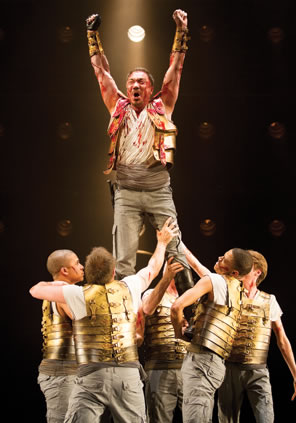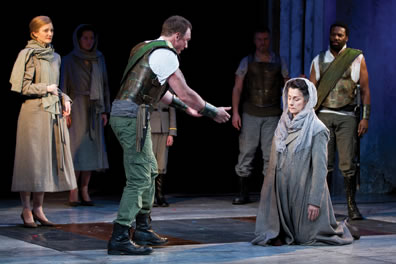Coriolanus
The Politics and Drama of Virility
Shakespeare Theatre Company, Harman Hall, Washington, D.C.
Tuesday, April 9, 2013, J-111&112 (center stalls)
Directed by David Muse

Caius Martius (Patrick Page) becomes a sword for his soldiers in Coriolanus. Photo by Scott Suchman, Shakespeare Theatre Company.
Certain senators or congress members like to say, "The American people want…" or "The American people don't want…" this or that. I cringe every time—every time—because inevitably I and, according to polls, the majority of people who identify themselves as Americans actually don't or do want what the politician says we do or don't want. Without really listening to us Americans, politicians attribute us for their own narrow-scoped personal or political interests.
Similarly, I got disgusted with the tribunes in the Shakespeare Theatre Company's production of Shakespeare's Roman tragedy Coriolanus. "The people" this and "the people" that, they say in public, but in private the two admit that keeping their positions of power as the plebeians' representatives is their primary objective, though they may honestly feel that by keeping their own power they truly are protecting the people. So, they manipulate the masses—interestingly, by building off a select minority of outspoken plebeians—to gain their own ends. They end up imperilling the nation, and the people end up feeling they were misrepresented. Of course, the patricians in this play are just as disturbing for their privileged attitudes and careless regard for the lower classes. What sets Senator Menenius and Consul Cominius apart from Caius Martius Coriolanus and his mother in their attitudes toward the plebeians is application: the former are disingenuous in their snobbery whereas the latter wear their snobbery like a badge on their breastplates (it's like the difference between "some of my best friends are black" bigots and redneck racists).
So, yes, pretty much all of the characters in Coriolanus annoy me, and when they are as annoying as they are in this Shakespeare Theatre Company production, consider that a triumphant success. Under David Muse's clear-eyed direction, the STC gives us a reading of this play that is as fresh as channel surfing among Bill O'Reilly, Wolf Blitzer, Chris Matthews, and Survivor: frustrating, funny, tragic, fascinating, and quite entertaining.
In his director's notes, Muse says his production won't take sides. "It's not what Shakespeare is up to," he writes. Yet, Muse casts Patrick Page in the title role, an actor whose attention-riveting performance could sway us to vote down the Constitution. Page's Caius Martius is a sinewy specimen, both physically and psychologically. His virility emanates through the whole theater, bursting out the doors, and coursing down D.C. boulevards. Think John McClane or an erudite Rambo, a warrior through and through, whom we can't help adore even as he's calling the body politic a "common cry of curs, whose breath I hate as reek o'th'rotten fens, whose loves I prize as the dead carcasses of unburied men that do corrupt my air." All he has to do is look at another soldier and that soldier gives up his knife. Yielding to this man seems the only course of common sense, and that becomes obvious within 30 seconds of meeting him. When Martius gets into one of his temper tantrums, Page's face goes bright, bright red with rage. One would think he hasn't an ounce of mother's milk in him.
Ah, but he is actually filled to the pores with his mother's milk. Volumnia is even more warrior than he, and Diane D'Aquila plays her as a dragon, her tongue as able as her son's knife to carve up a man. As sharp as D'Aquila's performance is and as commanding as Page's, the chemistry between these two actors ratchets up their scenes together several notches. They behave more like a long-married couple than do Martius and his wife, Virgilia (Aaryn Kopp), without the sex and, really, without much show of physical affection at all. This Volumnia exudes an agitated impatience with her son as if he were a 5-year-old, though she brags incessantly about his soldierly feats and keeps close count of his battle scars, regarding them with more esteem than she does the medals and laurel wreaths he bears. Page's Martius gets understandably exasperated with his mom, but he inevitably cows, calling back all his virility and stuffing it into his physical frame as he capitulates to her will.
In Rome's war against the Volsces, Martius is nobly heroic—crazy heroic, really, as he enters the gates of the Volscian city of Corioli all by himself. Martius emerges smothered in blood—Volscian blood, he assures us—and leads his inspired army on to conquest, thus earning him the surname of Coriolanus. His only military match is the Volscian general Aufidius (Reginald Andre Jackson), who by his own admission has been bettered by Martius the five times they have fought. The two opposing generals have an all-consuming respect for each other. "I'll fight with none but thee, for I do hate thee worse than a promise-breaker," Martius says when he first meets Aufidius at Corioli. "We hate alike," the Volscian replies. There's 10 times more affection in their use of the word "hate" than anything Martius shows his wife or son.
Coriolanus has no match in war, but in politics he gets overwhelmed. His open disdain of the plebeians and the quick temper he displays as he campaigns for consul end up getting him banished by the people. As a balance to Page's commanding performance, Muse cast a dozen talented actors to play the plebeians: citizens, soldiers, and servants. Shakespeare did not write the citizens in Coriolanus as the single-unit mobs he presented in earlier plays, such as Henry VI, Part Two and Julius Caesar. This is a true body politic made up of many different personalities and opinions. The plebeians on the whole seem fickle, whether it's the citizens shifting in the political winds—supporting Coriolanus for consul one minute and calling for his banishment the next—or Aufidius' servants comically changing their attitudes when they learn the mean stranger just arrived at their master's house is Coriolanus. However, there are some who show consistency in opinion throughout. Thanks to the acting, we come to know individual citizens such as the plebeian played by Avery Glymph who agitates for Martius' assassination in the first 10 lines of the play and advocates for his banishment in the consul crisis but denies he ever did so upon hearing the news that the banished Coriolanus has teamed with Aufidius to invade Rome.
Smart casting also gives heft to not only the part of Martius' father-figure friend Menenius (Robert Sicular) but also to Cominius (Steve Pickering), the sitting consul. Philip Goodwin and Derrick Lee Weeden play the tribunes as practiced politicians. However, when they scheme in private, an echo-chamber effect makes them sound sinister (I thought Muse said he wasn't going to take sides with this production). This annoyance at least induces a comic effect in their last such private discussion that ends with "Here comes his mother," "Let's not meet her"; the echo chamber amplifies their sudden transition from scheming to scared. Knowing this Volumnia as we do, we can't help sympathizing with the tribunes here.

As Virgilia (Aaryn Kopp, left) and Aufidius (Reginald Andre Jackson, right) look on, Coriolanus (Patrick Page) capitulates to his begging mother, Volumnia (Diane D'Aquila) in the Shakespeare Theatre Company production of Coriolanus. Photo by Scott Suchman, Shakespeare Theatre Company.
Aside from the gimmickry of the echo chamber, Muse has done a lot of things right in his staging of Coriolanus. The set, designed by Blythe R.D. Quinlan, is a simple one in appearance, a mass of concrete slabs filling in the space between pillars, chipped and stained to give a sense of worn grandeur. The panels open to represent areas for the patricians to watch over the plebeians, and the set divides at the back, opening to a multispotlight superstructure representing the world beyond Rome or the city inside Corioli's walls. The timeframe in costuming is mostly modern, but designer Murell Horton has incorporated Roman tunics into the suits of the tribunes and senators while the soldiers wear gold legionary breastplates over their battle fatigues. The plebeians serve as stagehands, and they use a variety of percussion instruments (from a crotales played with a bow to large Japanese drums) to set the moods of battles, domestic scenes, and public riots. The pace is steady, the play's inherent comedy ready, and the plot and action plays out with easy accessibility.
That last is most important, but the credit may not be all Muse's or the cast. Coriolanus is a dense play with no good guys and a central hero whose tragic flaw is that he's too heroic. It's not an easy read, and all these reasons may be why it is among the least produced of Shakespeare's plays. But when it is produced on stage with all the dynamic interrelationships that Shakespeare portrays—and I've now seen it four times (plus Ralph Feinnes' film version)—it is gripping theater in and of itself and because it so reflects the times we live in. Around 1608 Shakespeare wrote about the fledgling Roman society of 400 BC: But when we see Coriolanus, we see ourselves.
Eric Minton
April 15, 2013
This review also appears on PlayShakespeare.com
Comment: e-mail editorial@shakespeareances.com
Start a discussion in the Bardroom



 Find additional Shakespeareances
Find additional Shakespeareances